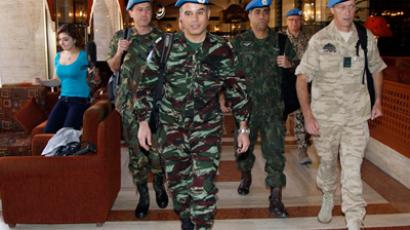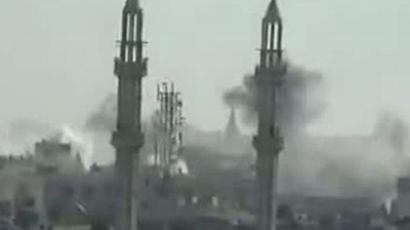Pressure rising: US calls for tougher measures on Syria
While Damascus and the UN have signed an agreement on the terms of the UN monitoring mission in Syria, the US has called for tougher sanctions against the Assad regime, including a global arms embargo.
The “Friends of Syria” coalition stepped up pressure on Syria during its meeting in Paris on Thursday. US Secretary of State Hillary Clinton insisted it was time to impose more sanctions on Damascus. “We need to start moving very vigorously in the Security Council for a Chapter Seven sanctions resolution, including travel, financial sanctions and arms embargo,” she told the envoys from the 14-nations group, which includes the US, Britain, Saudi Arabia, Turkey and Qatar.“We have to keep Assad off balance by leaving options on the table,” Clinton pointed out, making it clear that Washington has little faith in the success of special envoy Kofi Annan's six-point peace plan.She did not mention the possibility of military intervention during the meeting. However, on Thursday the Pentagon said it was ready to carry out whatever mission the president and Congress assigned to it.“Should we be called, our responsibility is clear: to provide the secretary of defense and the president with options, and these options will be judged in terms of their suitability, their feasibility and their acceptability,” Army General Martin Dempsey told the House Armed Services Committee.But much more aggressive calls are coming from the Syrian rebels. The Free Syrian Army has urged “countries friendly to the Syrian people” to carry out military intervention even without UN Security Council approval.Meanwhile Israel’s defense minister has claimed that the ouster of the Syrian president would be “very positive” as he has lost his legitimacy. Ehud Barak told CNN on Thursday that Assad’s fall would weaken Iranian influence in the region and be a setback for anti-Israeli forces in Lebanon and Gaza.
UN-Syria deal allows observers free access
The mounting pressure on the Syrian regime comes after the United Nations and Damascus signed an agreement on the terms of the UN monitoring mission in Syria. The document “aims to facilitate the task of the observers within the framework of Syrian sovereignty,” the country’s foreign ministry said.The preliminary agreement says the observers will have freedom to go anywhere in the country by foot or by car at any time, the Associated Press reports, citing the document. They will be allowed to take pictures and use technical equipment to monitor compliance with the ceasefire. In addition, observers will also be allowed to install temporary observation posts in cities and towns and to monitor military convoys approaching population centers. They will also have freedom to investigate any potential violations and to access prisons and medical centers in coordination with the International Committee of the Red Cross and Syrian authorities.The use of helicopters and aircraft is still under discussion.Confirmation has come from the UN chief, Ban Ki-moon, who said that the Syrian authorities had assured him that they would fully support the UN observer mission and secure all the necessary conditions for UN monitors. Earlier on Thursday, Ban had criticized Syria for failing to fully implement the six-point peace plan.
However despite the ceasefire and the deal reached between the UN and Syria, violence continues. An RT crew came under fire in the city of Deraa. “When we arrived in the city, clashes intensified. I could hear the sound of gunfire, as a result our visit was cut short,” says RT’s correspondent Oksana Boyko. The gunfire came as a group of UN observers also arrived in the city. A local official told RT that rebels are using high-profile visits to provoke government forces into military action in order to undermine the fragile ceasefire.
Sarah Marusek, a researcher from Syracuse University, says the cooperation between the Syrian authorities and the UN is “incredibly significant.”“This means the UN observer mission could actually produce some results because it is talking to everybody, and people consider them seriously,” she told RT adding that “it is the best and the most promising development we have seen in a long time.”Speaking about the meeting of Western nations and Arab states in Paris to discuss further sanctions against Damascus, Marusek said “this contradiction just shows that these countries don’t want a solution in Syria that is fair and just.”“They want regime change and will stop at nothing to achieve this regime change,” she warned.














